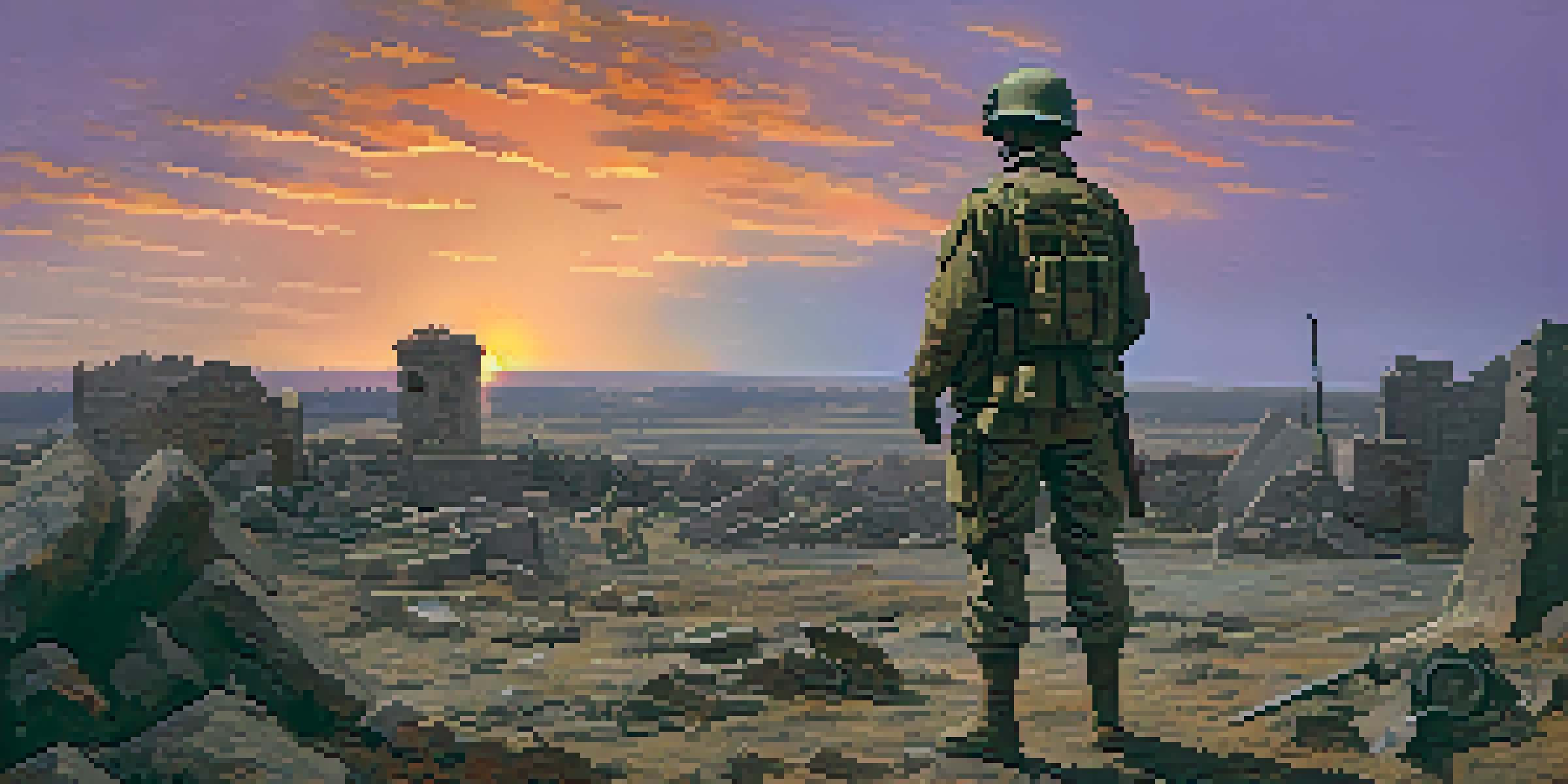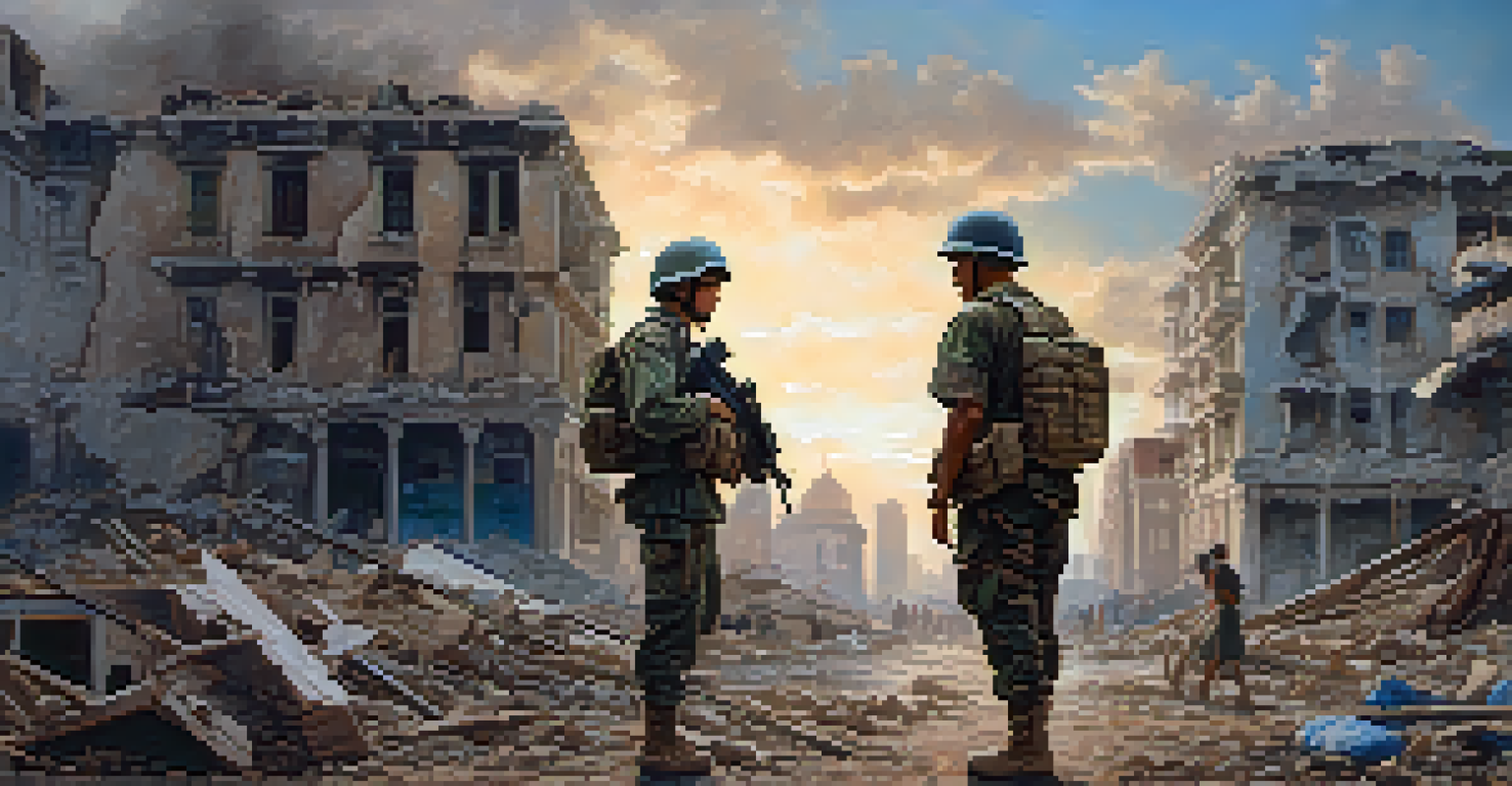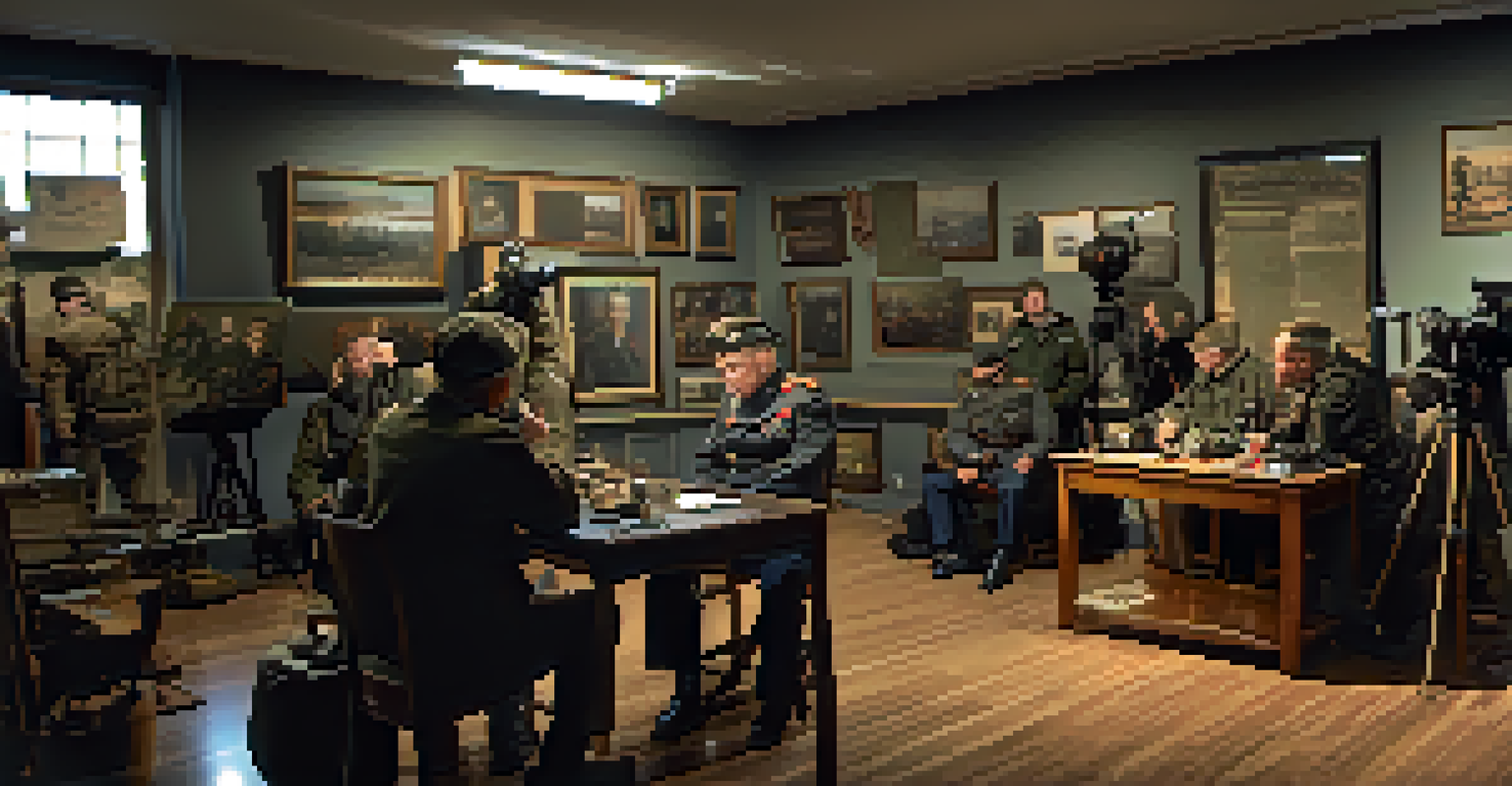The Impact of Film on Public Perception of War and Conflict

The Power of Storytelling in Film and War
Film has an incredible ability to tell stories that resonate deeply with audiences. Through powerful narratives, filmmakers can transport viewers to the front lines of conflict, making the abstract tangible. For instance, movies like 'Saving Private Ryan' immerse viewers in the experiences of soldiers, creating an emotional connection that words alone often can’t achieve.
The greatest weapon against stress is our ability to choose one thought over another.
This storytelling aspect helps to humanize the individuals affected by war, reminding us that they are not just statistics or headlines. By presenting personal stories, films can evoke empathy and encourage viewers to consider the broader implications of conflict. As a result, audiences are often left with a more nuanced understanding of the complexities surrounding war.
Moreover, these narratives can challenge prevailing stereotypes and misconceptions, prompting discussions about the realities of conflict. When filmmakers portray the experiences of diverse perspectives—such as soldiers, civilians, or even opposing forces—they open the floor for dialogue that can reshape public perceptions.
Historical Accuracy vs. Artistic License in War Films
One of the ongoing debates in the realm of war films is the balance between historical accuracy and artistic license. While some filmmakers strive to depict events as faithfully as possible, others may take liberties for dramatic effect. This can lead to a skewed public perception, where audiences may not fully understand what really occurred during a conflict.

For example, films like 'Black Hawk Down' provide a gripping portrayal of a specific military operation but may gloss over the broader political context. This selective storytelling can shape viewers' opinions, often framing conflicts in a way that aligns with the filmmakers' perspectives. As a result, audiences might walk away with a distorted view of history.
Storytelling Evokes Empathy
War films humanize the experiences of those affected by conflict, fostering emotional connections and understanding.
It's essential for viewers to approach these films with a critical mindset, recognizing that while they can be entertaining and informative, they are still interpretations of events. Understanding the difference between fact and fiction is crucial in forming a well-rounded view of war and conflict.
Influence of War Films on Public Sentiment
Films about war can significantly influence public sentiment, especially during times of actual conflict. For instance, movies released during the Vietnam War era sparked widespread protests and conversations about morality and military intervention. The emotional weight of these films often mirrored the societal feelings of the time, amplifying voices that called for change.
Movies are a little bit like life, they can be a metaphor for war, and they can be a metaphor for peace.
Additionally, contemporary films continue to shape how we view modern conflicts, often reflecting current political climates. When a film portrays a conflict in a particular light—heroic, tragic, or senseless—it can sway public opinion and even influence policy decisions. This phenomenon highlights the responsibility filmmakers have in crafting narratives that resonate with audiences.
Ultimately, the emotional responses elicited by war films can mobilize public action, whether that be support for veterans or calls for peace. This connection between cinema and societal change underscores the profound impact films can have on collective consciousness.
The Role of Documentaries in War Representation
Documentaries play a vital role in presenting real-life accounts of war and conflict, often serving as a corrective to dramatized narratives. Films like 'Restrepo' provide an unfiltered glimpse into the lives of soldiers, allowing audiences to witness the harsh realities they face. This raw representation can be more impactful than fictional portrayals, as it confronts viewers with the truth of war.
Moreover, documentaries often give voice to those directly affected by conflict, including civilians, refugees, and veterans. By sharing these stories, filmmakers can shine a light on the humanitarian crises that accompany war, fostering a deeper understanding of the human cost involved. This kind of storytelling can lead to increased awareness and advocacy for those suffering in war-torn regions.
Cultural Perspectives Shape Narratives
Different societies produce war films that reflect their unique values and interpretations of conflict, enriching global discussions.
The impact of documentaries extends beyond the screen, as they often prompt discussions and actions in audiences. Viewers may feel compelled to support various initiatives or engage in activism, demonstrating the power of documentary film as a tool for social change.
The Emotional Impact of War Films on Audiences
The emotional impact of war films is profound, as they often evoke strong feelings of empathy, anger, or sadness. These reactions can be attributed to the intense portrayals of loss, courage, and sacrifice that are prevalent in many films. By tapping into these emotions, filmmakers can create a powerful connection between the audience and the subject matter.
For instance, films such as 'Schindler's List' not only depict the horrors of war but also highlight acts of humanity amidst chaos. This duality can leave audiences grappling with conflicting emotions, prompting them to reflect on their own beliefs about conflict and morality. Such films can serve as a catalyst for personal introspection and societal discussions.
Additionally, the cathartic experience of watching war films can lead to a greater understanding of the psychological toll of conflict on individuals. When viewers witness the struggles of characters dealing with trauma, they may become more empathetic towards real-life veterans or survivors, fostering a sense of compassion and solidarity.
Cultural Perspectives in War Films
War films often reflect the cultural perspectives of the societies that produce them, showcasing varying narratives based on national identity and values. For example, American war films might emphasize themes of heroism and sacrifice, while films from other countries may focus on the futility of war or the impact on civilians. This diversity in storytelling enriches the global dialogue about conflict.
By examining these cultural perspectives, audiences can gain insights into how different societies interpret war. For instance, films like 'The Battle of Algiers' present a critical view of colonialism and resistance, challenging viewers to reconsider their assumptions about conflict. Such films can serve as important educational tools, broadening viewers' understanding of global issues.
Documentaries Present Raw Truths
Documentaries provide unfiltered accounts of war, highlighting the human cost and prompting audience advocacy for affected individuals.
Ultimately, recognizing the cultural context behind war films can enhance viewers’ appreciation for the medium. It allows for a more comprehensive understanding of the complexities of conflict and encourages a more empathetic approach to different narratives.
The Future of War Films in a Changing Landscape
As societal attitudes towards war and conflict continue to evolve, so too will the nature of war films. The rise of streaming platforms and digital media has opened up new avenues for storytelling, allowing for more diverse voices and innovative narratives. This shift is likely to challenge traditional portrayals of war, offering fresh perspectives that reflect contemporary issues.
Moreover, as global conflicts change and new generations of filmmakers emerge, audiences can expect to see a broader range of themes explored in war films. From the psychological impacts of combat to the experiences of marginalized groups, these stories will contribute to a more nuanced understanding of conflict in our world.

In this ever-changing landscape, it’s crucial for filmmakers to remain aware of their responsibility in shaping public perception. By prioritizing authenticity and empathy in their storytelling, they can continue to engage audiences and spark important conversations about war and its consequences.